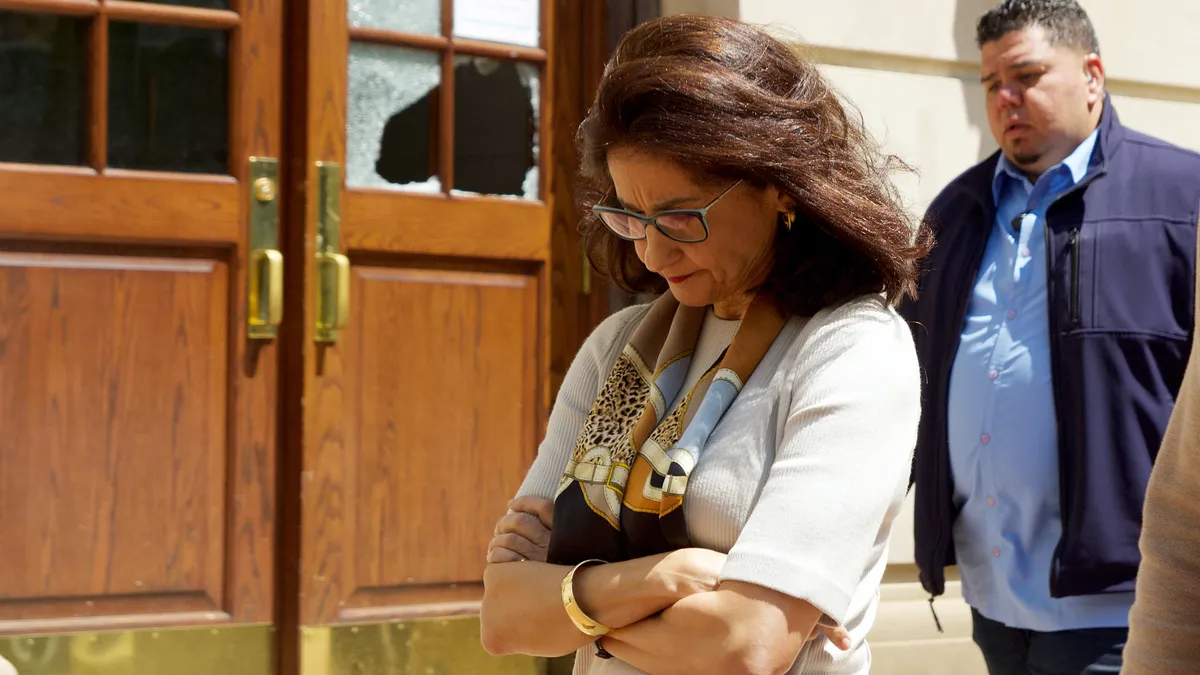Dive Brief:
- Minouche Shafik resigned as president of Columbia University Wednesday following months of calls for her departure from both pro-Palestinian protesters and their critics.
- Dr. Katrina Armstrong, Columbia's faculties of health sciences dean and CEO of the university's Irving Medical Center, took over as the Ivy League institution's interim president following Shafik’s announcement.
- The change in leadership comes less than three weeks before the start of the fall semester. A university spokesperson Thursday declined to address questions about Columbia's search process for a permanent replacement.
Dive Insight:
Shafik became Columbia's president just over a year ago, in July 2023. Shortly thereafter, the Oct. 7 Hamas attack on Israel reignited conflicts in the region, and the resulting tumult that spilled onto college campuses became a signature of her tenure.
Colleges — long home to student activism — struggled to balance free speech rights and harassment protections amid anti-war protests. At Columbia, students called for the university to divest from Israel-affiliated companies and weapons manufacturers.
But the protesters also faced accusations of antisemitism. Shafik testified in April to the House education committee on the topic — her appearance was not well received by either side.
Shafik's resignation makes her the third president of a high-profile, selective university to step down following a congressional grilling. Claudine Gay of Harvard University and Elizabeth Magill of the University of Pennsylvania were both pushed out from their positions after testifying before the committee in December.
Following Shafik's testimony, an escalation in protests and encampments forced Columbia to the center of the debate over pro-Palestinian demonstrations and antisemitism on college campuses.
Shafik faced criticism from nearly every constituency under her purview. Protesters accused her of silencing dissent and violating Columbia's policies. Jewish affinity groups tied to the university blamed her for allowing hate speech and called on her to enact zero tolerance policies. Faculty groups walked out over her decision to invite police onto Columbia's private campus to break up protests and arrest students.
In addition, conservative lawmakers, like Rep. Virginia Foxx, blasted Shafik for being too weak in disciplining faculty and students who violated Columbia's harassment policies.
Foxx, a North Carolina Republican and chair of the House Education and the Workforce Committee, also consistently criticized Shafik for allowing a culture of antisemitism to thrive.
"During Shafik’s presidency, a disturbing wave of antisemitic harassment, discrimination, and disorder" engulfed Columbia's campus, Foxx said in a Wednesday statement. "Flagrant violations of the law and the university rules went unpunished."
"Columbia’s next leader must take bold action to address the pervasive antisemitism, support for terrorism, and contempt for the university’s rules that have been allowed to flourish on its campus," Foxx continued.
Armstrong, who Foxx did not reference by name, acknowledged that Columbia is in the midst of a pivotal moment.
"I am acutely aware of the trials the University has faced over the past year," she said in a Wednesday statement. "We should neither understate their significance, nor allow them to define who we are and what we will become."
Armstrong said her tenure as head of Columbia's medical center has been grounded in "consistent engagement with the entire faculty," a methodology she intends to carry over into her interim presidency.
On Wednesday, David Greenwald and Claire Shipman, co-chairs of Columbia's trustee board, praised Armstrong as an empathic leader, scientist and humanist.
"Katrina brings a truly exceptional skillset to our University and our current challenges," Greenwald and Shipman said in a joint statement. "We believe that Katrina is the right leader for this moment. We are grateful to her for stepping in, and we call on our community to support her."
Armstrong also said that Shafik, as well as former long-time Columbia President Lee Bollinger, will remain available to her and the university moving forward.
Shafik, who will take a position with the foreign secretary of the United Kingdom, said she timed her announcement to allow for a leadership change prior to the fall semester.
"I have tried to navigate a path that upholds academic principles and treats everyone with fairness and compassion. It has been distressing — for the community, for me as president and on a personal level — to find myself, colleagues, and students the subject of threats and abuse," Shafik said in her announcement.
Armstrong is unlikely to have any easier time than her predecessor did. In addition to being under the watchful eye of federal lawmakers, she will be contending with student activism groups, like Columbia Students for Justice in Palestine, pushing for divestment.
"To be clear, any future president who does not pay heed to the Columbia student body’s overwhelming demand for divestment will end up exactly as President Shafik did," Columbia SJP said on social media Wednesday.














